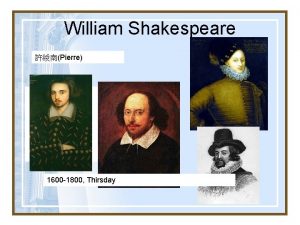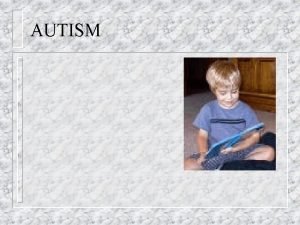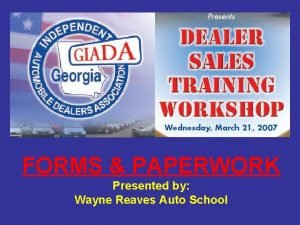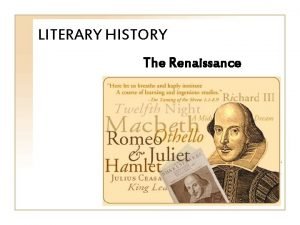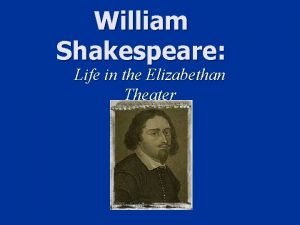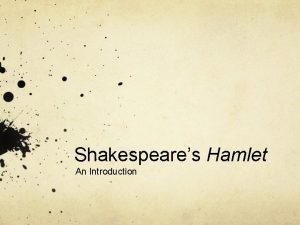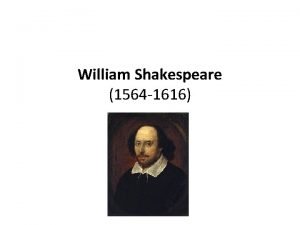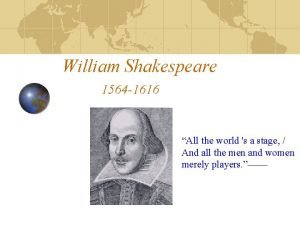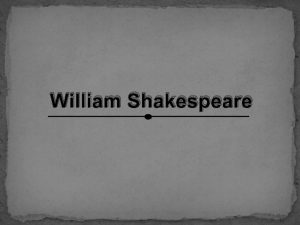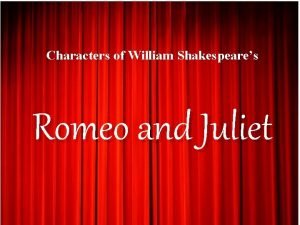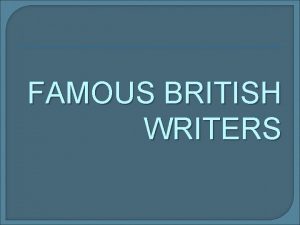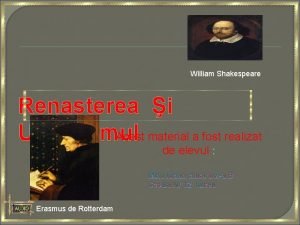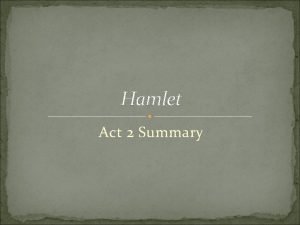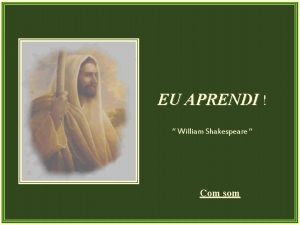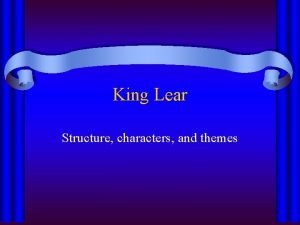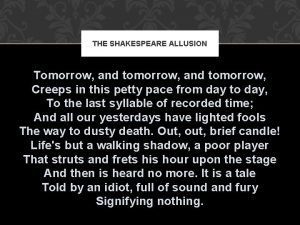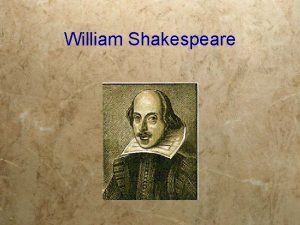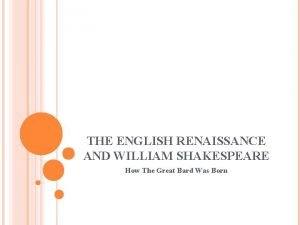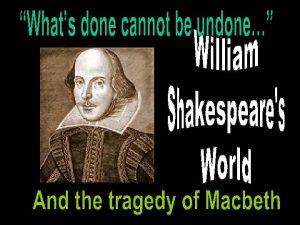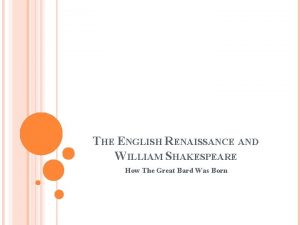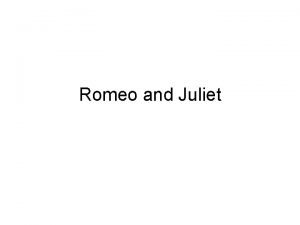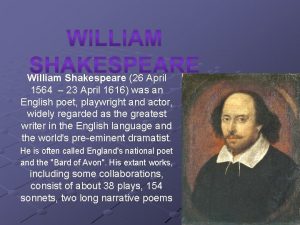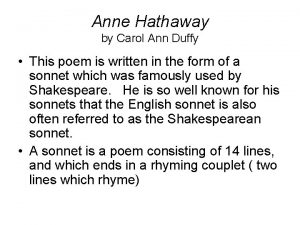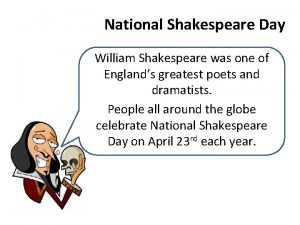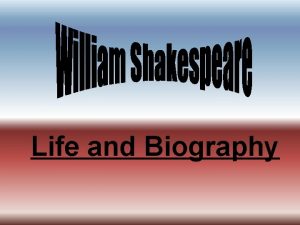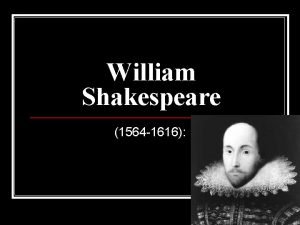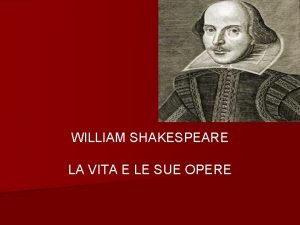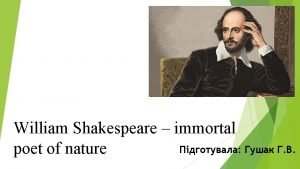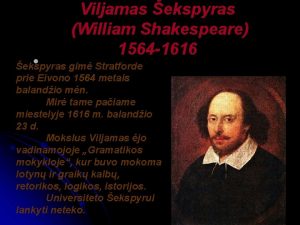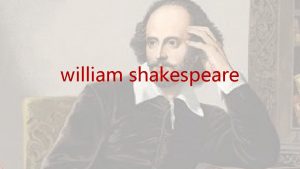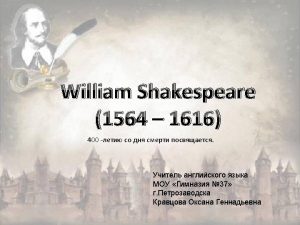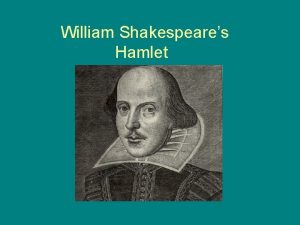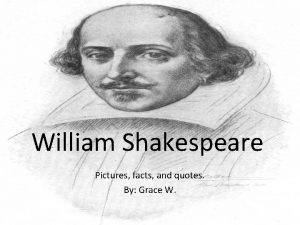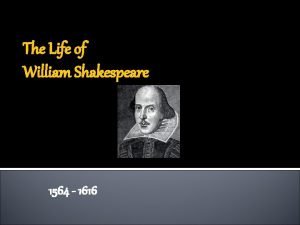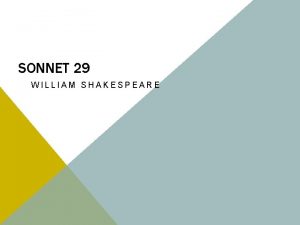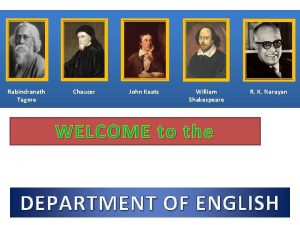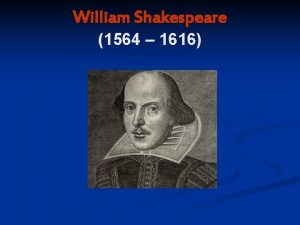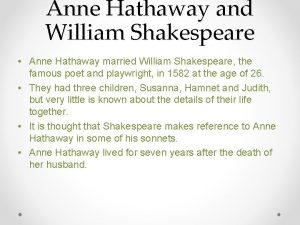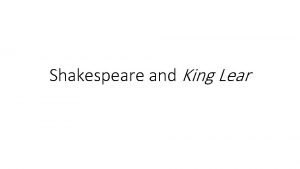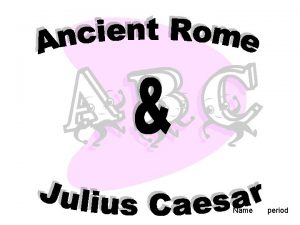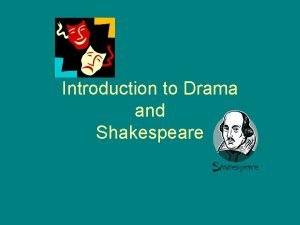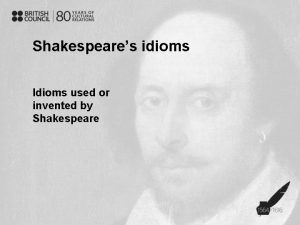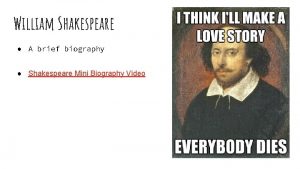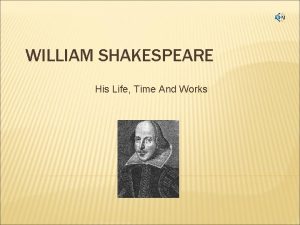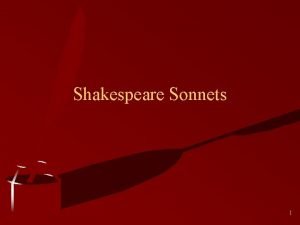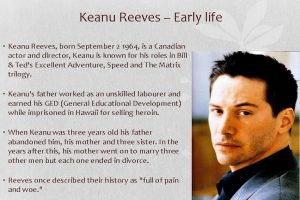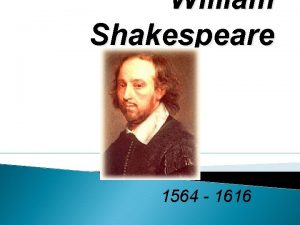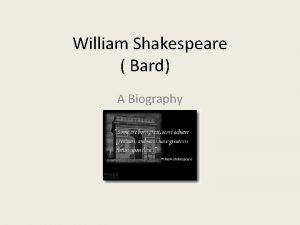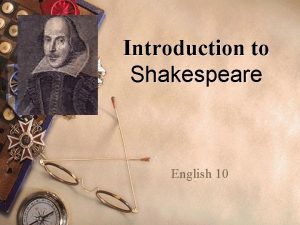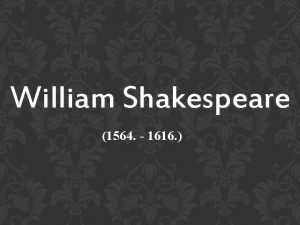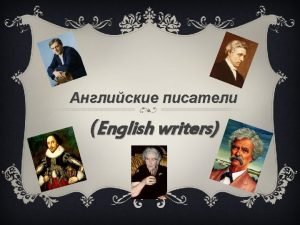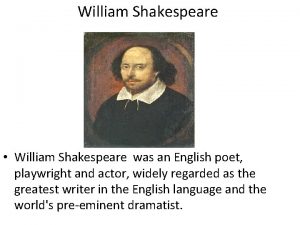William Shakespeare Pierre 1600 1800 Thirsday Keanu Reaves


































































- Slides: 66

William Shakespeare 許綬南(Pierre) 1600 -1800, Thirsday

Keanu Reaves and River Phoenix in My Own Private Idaho. The film is based on Shakespeare’s Henry IV.

To be or not to be Ethan Hawke as Hamlet, Diane Venora as Gertrude, and Kyle Mac. Lachlan as Claudius

Measure for Measure http: //www. cheekbyjowl. com/measure_for_ measure. php

Merchant of Venice http: //www. simplydustinhoffmangallery. com /gallery/thumbnails. php? album=39

Phrases from Shakespeare • What’s Done is Done. (Lady Macbeth) • Fortune’s Fool (Romeo) • Tomorrow, and Tomorrow (Macbeth) • Hoist with his own Petard (Hamlet) • He hath Eaten me out of House and Home (Hostess Quickly in Henry IV) • ’Tis Better to be Vile than Vile Esteemed (sonnet 121)

• Not all the water in the rough rude sea • Can wash the balm off from an anointed king […]. • Richard II, 3. 2

Shakespeare’s Time Martin Luther, Norton Literature on Line • Henry VIII (divorce) • Elizabeth (Anglican Church formalized/compromise) • James I(“the wisest fool in Christendom/King James Bible) • Shakespeare born of a Catholic family

Shakespeare’s Time Princes of Virginia, Norton Literature on Line • Elizabeth reigned (1558 -1603) • James I (1603 -25) 3 millions inhabitants in the country • 200, 000 in London • 1500 in Stratfordupon-Avon

• Sidney and Spenser’s Poetry • First permanent theater (1576) • The Elizabethan theater: cut across class lines • Ben Jonson: “he was not of an age, but for all time!” (political and religious From Norton Literature on censorship? ) Line

• “He was a man, take him for all in all • I shall not look upon his like again […]. ” • Hamlet 1. 2

Shakespeare’s Life (1564 -1616) • Born to John Shakespeare, a glove-maker, high bailiff in the town council, but John’s business later failed. • Married Anne Hathaway, eight years his senior, in 1583. • Attended grammar school (ridiculed by universityeducated rival playwrights) • Might be an actor for some time after 1592 before becoming a playwright.

• Early plays presented at the Rose, London’s most popular theater in the 1590 s. • Shareholder of the Lord Chamberlain’s Men (1594), later the King’s Men( ) • Globe (1599/ 2000 spectators) and Richard Burbage: tragedies

• Plague (1592), Shakespeare turned to poetry. • Tragedies • Father’s death (1601) or his 40 th birthday/other playwrights wrote tragedies at that time, too. • Romances • Tempest (Shakespeare’s last play, on his own)

Probably died because drinking too much at his daughter’s wedding/“I give unto my wife my second-best bed. ” (1616)

The Elizabethan Stage

• “There is an upstart crow, beautified with our feathers, that with his ‘Tiger’s heart wrapt in a player’s hide’ supposes he is well able to bombast out blank verse as the best of you […] the only Shake-scene in a country” • From Robert Greene

300 playwrights in competition miracle play (11 th C. ) mystery play (14 th C. morality play, still in a rage, played in the courtyards of inns.

Into the Elizabethan Plays • Actors tried their hands at writing • The so-called “University Wits”: Marlowe among them • So plays began to move beyond the focus of morality plays. • (The playwrights’ main concern was to fill theatres, with little heed to the rules of classical drama. )

The Swan Theatre A 1596 sketch of a performance in progress on the thrust stage of The Swan, a typical circular Elizabethan open-roof playhouse.

The Theatre Around 1580 The original Theatre (1576) and the Curtain Theatre (1577) Total theatre capacity of London was about 5000 spectators With the building of new theatre facilities The Rose (1587), The Swan (1595), The Globe (1599), The Blackfriars (1608),

Location of Theaters • Mostly outside the boundaries of the City of London in areas known as “liberties, ” beyond the direct control of Puritan city elders. • In 1642, Parliament closed all theaters, under Puritan influence. When the order was lifted in 1660 under Charles II, not one theater remained standing.

Censorship • No new play could be performed without the consent of the Master of the Revels. • Edward Tilney, however, to the distress of Puritans, cared less in suppressing lewdness than in spotting political and religious seditious matter.

Actors • A flag flying above theater: a performance was under way • All men and boys • The stage is bare. Occasionally an actor would inform the audience of a change of location. • No stage director. The play was what the playwright wrote and the actors interpreted.

Difference between the Elizabethan and Jacobean Drama • Elizabethan Theater: optimistic, lighthearted • Jacobean Theater: sombre, moralizing, introvert (Shakespeare’s later plays, Volpone) • (Whitehall: this candle-lit hall affected the staging of plays. Night scene could be portrayed realistically, and the use of flying spirits became common practices. )

The Publication of Shakespeare • Tear him for his bad verses, • tear him for his bad verses! • Julius Caesar, 3. 3

Problems • Right of the script belonged to theater company, not to the playwright. • Publication did no good to Shakespeare’s company, since other companies could get the script and stage the play.

First Folio published in 1623. John Hemminge and Henry Condell, colleagues from the King’s Men, tracked down and edited 36 of Shakespeare’s plays.

Genre • Categories in the First Folio unacceptable. • “Those which are called histories, and even some of his comedies, are really tragedies, with a run or mixture of comedy amongst them, ” wrote Nicholas Rowe in 1709. • Problem Plays: Measure for Measure, Troilus and Cressida, All’s Well that Ends Well

Shakespeare’s Language • Before Roman Emperor Claudius’s conquest of Britain in 43 AD: Celtic inhabitants’ language similar to modern Irish, and Scottish Gaelic. • The Romans departed in 410: the languages of Germanic peoples (notably the Angles and Saxons) dominated. We have the OLD ENGLISH.

• The Vikings’ raids in the 8 th and 9 th Century added Scandinavian words to OLD ENGLISH. (Beowulf) • The Norman Conquest in 1066: French and Latin into English. (The Canterbury Tales in 14 th Century) We have the MIDDLE ENGLISH.

• William Caxton set the first English printing press in the late 15 th century/Columbus and the New World/translations. We have MODERN ENGLISH.

Examples • Heard, hand-locen; hring-iren scňr • Hard, hand-fastened; and the shining iron rings • (Beowulf) • Ful weel she soong the service dyvyne, • Full well she sings the service divine • (The Canterbury Tales/ service: Old French)

• • Be not afeard; the isle is full of noises (noise: Old French noise (noise: Latin nausea, seasickness Shakespeare’s The Tempest

Elizabethan Wordplay • “What’s in a name? That which we call a rose • By any other word would smell as sweet. • (Romeo and Juliet, 2. 2)

Expressions Created • • Elbow room Cold comfort Puppy dog Shooting star Love is blind Love letter Marriage bed An eye-sore….

Words Created • • Academe Advertising Drug Embrace Employer Glow Gossip Watchdog….

Shakespeare’s Prose and Verse • Verse for noble speaker • Prose for common or comic parts • To be, or not to be—that is the question; • Whether ’tis nobler in the mind to suffer • (Hamlet) • I have a whole school of tongues in this belly of mine, and not a tongue of them all (Henry IV)

Shakespeare’s Meters • • • iamb ( ): revenge Trochee ( ): midnight Dactyl( ): document Spondee ( ): amen Anapest ( ): underneath

Blank verse • • • Usually ten syllables a line Iambic pentameter Unrhymed Sometimes heroic couplet Good to express harmony, but expressive of intensities as well

Examples • Harmony: • Care keeps his watch in every old man’s eye, • And where care lodges, sleep will never lie. (Romeo and Juliet)

Examples • Intensities • Tomorrow, and tomorrow, • Creeps in this petty pace from day to day.

How Meters to Express the Mental State • The lights burn blue. It is now dead midnight. • Cold fearful drops stand on my trembling flesh. • What do I fear? Myself? There’s none else by. • Richard Loves Richard: that is, I am I. • Is there a murderer here? No. Yes. I am.

William Shakespeare (1564 -1616) (from Wikipedia) An English poet, dramatist and actor He wrote about 37 plays and 154 sonnets, as well as a variety of other poems.

William Shakespeare (1564 -1616) (from Wikipedia) • The most quoted writer in the literature and history of the English-speaking world. • Considered to be England's national poet and is sometimes referred to as the "Bard of Avon" (or simply "The Bard") or the "Swan of Avon".

William Shakespeare (1564 -1616) (from Wikipedia) Produced most of his work between 1586 and 1612, although the exact dates and chronology of the plays attributed to him are under considerable debate.

William Shakespeare (1564 -1616) (from Wikipedia) He is counted among the very few playwrights who have excelled in both tragedy and comedy, and his plays combine popular appeal with complex characterization, poetic grandeur and philosophical depth.

William Shakespeare (1564 -1616) (from Wikipedia) His many quotations and neologisms have passed into everyday usage in English and other languages

William Shakespeare (1564 -1616) (from Wikipedia) • Over the years, many people have speculated about Shakespeare's life, raising questions about his sexuality, religious affiliation, and the authorship of his works.

William Shakespeare: 3 Stylistic Groups His plays tend to be placed into three main stylistic groups: early comedies and histories (range from broad comedy to historical nostalgia) Much Ado about Nothing The Twelfth Night A Midsummer Night’s Dream

William Shakespeare: 3 Stylistic Groups middle period (which includes his most famous tragedies that are grander in terms of theme, addressing such issues as betrayal, murder, lust, power, and ambition ): Othello Macbeth Hamlet King Lear

William Shakespeare: 3 Stylistic Groups as well as "problem plays" Troilus and Cressida Measure for Measure) later romances featuring redemptive plotlines with ambiguous endings and the use of magic and other fantastical elements The Winter's Tale The Tempest

Transition by Genres • Delightful Comedies: falling in love • Ambitious Tragedies: marital conflict, murderous envy, philosophical doubt, aging, fear of death • Comedies: sorrow and world-weariness

William Shakespeare: Style Playwrights like Thomas Kyd and Christopher Marlowe and Shakespeare began to revolutionise theatre. Their plays blended the old morality drama with academic theatre to produce a new secular form.

William Shakespeare: Style • The new drama had – the poetic grandeur – philosophical depth of the academic play – bawdy populism of the moralities.

William Shakespeare: Authorship Christopher Marlowe is considered by some to be the most highly qualified to have written the works of Shakespeare.

William Shakespeare: Authorship – Marlowe's recorded death in 1593 was faked – Marlowe went into hiding, subsequently writing under the name of William Shakespeare

William Shakespeare: Authorship Sir Francis Bacon is another proposed author for the Shakespeare works.

– “Traveling to some of the countries in which the plays are set – Reading the Shakespeare sources in their original Greek, Italian, Hebrew, or French. – He described himself as a "Concealed Poet" and was alive at the time of the publication of the First Folio in 1623. • Arguments against Bacon – No time to write so many plays – His style is different from Shakespeare's

William Shakespeare: Religion Shakespeare’s Catholicism is by no means universally accepted. The Catholic Encyclopedia questions not only his Catholicism, but whether

William Shakespeare: Religion "Shakespeare was not infected with the atheism, which. . . was rampant in the more cultured society of the Elizabethan age. “

William Shakespeare: Religion Stephen Greenblatt suspects Catholic sympathies of some kind or another in Shakespeare and his family but considers the writer to be a less than pious person with essentially worldly motives.

William Shakespeare: Sexuality Homoerotic allusions in a number of his works have led commentators to contemplate Shakespeare's possible bisexuality.

William Shakespeare: Sexuality • In Sonnets – 26 of the Sonnets are love poems addressed to a married woman (the "Dark Lady"), – 126 are addressed to a young man (known as the "Fair Lord"). • The amorous tone focuses on the young man's beauty • Nonetheless, others interpret them as referring to intense friendship rather than sexual love.

Othello, King Lear, The Tempest, Sonnets • Othello: full of intensities • King Lear: probing deep into human nature • The Tempest: Shakespeare’s last play on his own. Political, religious, and theatrical interest. • Sonnets

Works Cited for the Above Slides • • • Wikipedia How to Read a Shakespeare Play Essential Shakespeare Norton Literature on Line http: //www. reverseshot. com/article/my_own_priv ate_idaho_0 • http: //www. myownprivateidaho. com/ • http: //www. popmatters. com/film/reviews/h/hamle t. shtml • http: //www. bardolatry. com/hawkeham. htm
 Comfortpuppy drama
Comfortpuppy drama Keanu reeves
Keanu reeves Keanu reeves
Keanu reeves Wayne reaves auto school
Wayne reaves auto school Themes about jealousy examples
Themes about jealousy examples The renaissance literature
The renaissance literature Fun facts about william shakespeare
Fun facts about william shakespeare Introduction of hamlet
Introduction of hamlet Desert shakespeare
Desert shakespeare Dílo william shakespeare
Dílo william shakespeare William shakespeare 1564 to 1616
William shakespeare 1564 to 1616 Shakespeare was born in
Shakespeare was born in Romeo and juliet dramatis personae
Romeo and juliet dramatis personae English writer
English writer When was macbeth written
When was macbeth written April 23, 1564
April 23, 1564 William shakespeare referat
William shakespeare referat Hamlet act two summary
Hamlet act two summary Eu aprendi william
Eu aprendi william Characters king lear
Characters king lear Summary romeo and juliet
Summary romeo and juliet What does tomorrow and tomorrow and tomorrow mean
What does tomorrow and tomorrow and tomorrow mean Early years of william shakespeare
Early years of william shakespeare Was william shakespeare in the renaissance
Was william shakespeare in the renaissance William shakespeare about his life
William shakespeare about his life William shakespeare lived
William shakespeare lived Mary sidney shakespeare
Mary sidney shakespeare Shakespeare wrote romeo and juliet
Shakespeare wrote romeo and juliet William shakespeare professions
William shakespeare professions 23 april shakespeare
23 april shakespeare Ann hathaway carol ann duffy
Ann hathaway carol ann duffy William shakespeare 1610
William shakespeare 1610 Lord chamberlain theatre
Lord chamberlain theatre National shakespeare day
National shakespeare day William shakespeare biography
William shakespeare biography What is written on shakespeare�s tombstone
What is written on shakespeare�s tombstone William shakespeare vita
William shakespeare vita William shakespeare poem on nature
William shakespeare poem on nature Shakespeares career
Shakespeares career Sonnet 65 by william shakespeare summary
Sonnet 65 by william shakespeare summary Renesance osobnosti
Renesance osobnosti William shakespeare family tree
William shakespeare family tree Othello webquest
Othello webquest William shakespeare biography
William shakespeare biography Shakespeare biography english
Shakespeare biography english Shakespeare was known as the world's greatest
Shakespeare was known as the world's greatest Mapa conceptual del teatro
Mapa conceptual del teatro William shakespeare 1601
William shakespeare 1601 Sonnet 42 petrarch
Sonnet 42 petrarch Renssansen
Renssansen William shakespeare pictures
William shakespeare pictures Sonnet 60 summary
Sonnet 60 summary Shakesphere sonnets
Shakesphere sonnets William shakespeare retirement
William shakespeare retirement Sonnet 29 rhyme scheme
Sonnet 29 rhyme scheme Rabindranath tagore and william shakespeare
Rabindranath tagore and william shakespeare Shakespeare born
Shakespeare born William shakespeare birth date
William shakespeare birth date William shakespeare anne hathaway marriage
William shakespeare anne hathaway marriage Meantime we shall express our darker purpose
Meantime we shall express our darker purpose Los padres de william shakespeare
Los padres de william shakespeare William shakespeare
William shakespeare Othello themes
Othello themes William shakespeare's idioms
William shakespeare's idioms William shakespeare biography video
William shakespeare biography video William shakespeare childhood
William shakespeare childhood Shakespeare sonnets 1
Shakespeare sonnets 1
